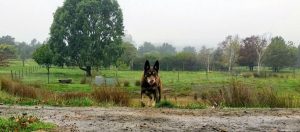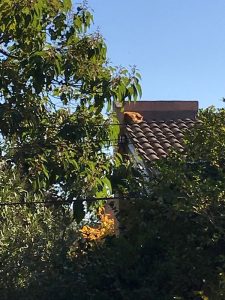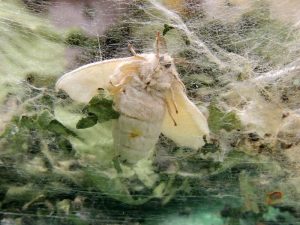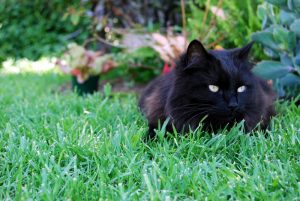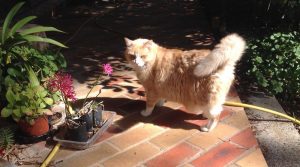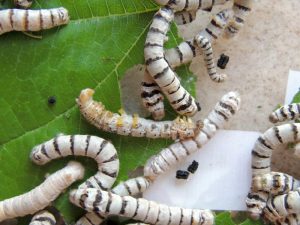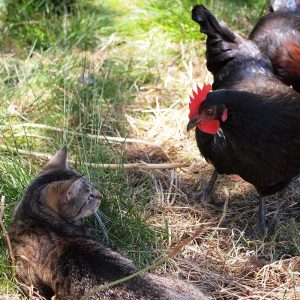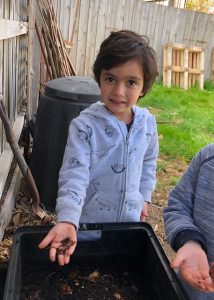Thanks to all the people who have contributed to this week’s newsletter: Angelo Eliades, Choon Yin Yeok, Doris Glier, Fay Loveland, Fiona Finch, Fuchsia Branwhite, Glenis Vieux, Helen Cline, Jenny Shaw, Kate Shannon, Kim Lam, Laura Finch, Mahira Sobral, Mala Plymin, Megan Goodman, Natalie Nigol, Richard Rowe, Robin Gale-Baker, Soo Mei Leong, Susan Palmer, Velyne Moretti, Vicki Jordan and Virginia Solomon.
Which farmer’s markets will be happening this weekend?
Coburg on Saturday; Alphington and Eltham on Sunday. Not Bundoora Park, Carlton or Heathmont.
Helen Cline has written in to say that Boroondara Farmers’ Market has now re-started and that the next market will be on Saturday, 20th June. Thanks for the heads up, Helen!
Community garden news
Macleod Organic Community Garden has been awarded a grant of $4,000 by the Commonwealth for an equipment store.
From their Facebook pages, it looks like a few community gardens have begun to re-start their regular get togethers. These include Links, Northcote Library and Thrive.
Our photo competition
Last week’s competition
The theme of last week’s competition was pets. It attracted 12 entries (perhaps it would have attracted more entries if there hadn’t been a typo in the email link!).
After due consideration, the winner of the meal for two at a restaurant of their choice is Laura Finch for her picture of silkworm caterpillars. Congratulations, Laura!
An honorary mention goes to Leah Lux Tame for her picture of Jinx the cat and Darth the chicken. She win a consolation jar of honey from Backyard Honey.
Thanks to everyone else who participated.
Here are all 12 entries (3 to a row for presentational reasons on mobile phones). Click any picture to view a larger version.
When Fiona and Laura submitted their photos of their pet silkworms, they commented that they didn’t live for very long. More specifically, it appears that their total lifecycle is around 11 weeks (egg for 2 weeks, caterpillar for 5 weeks, pupa for 3 weeks, and moth for a week). Read this page for more information.
The week’s competition
We are going to give the photo competitions a rest for a bit. Thanks to everyone who has contributed – it has been a blast!
No, you didn’t know!
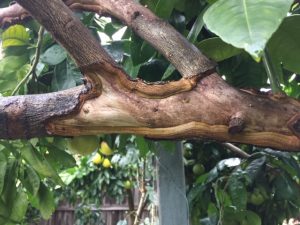 Last week, Jan Akeroyd asked what is going on with her grapefruit tree (see picture) but no one answered. Anyone want to answer this week? Email me.
Last week, Jan Akeroyd asked what is going on with her grapefruit tree (see picture) but no one answered. Anyone want to answer this week? Email me.
Guy’s veggie growing tip – saved seeds – part 2: the practicalities
Although, as per last week’s article, the seeds of a named variety of vegetable will be largely genetically uniform, there will still be minor variations. Choose the best fruit (and thus the best seeds) for your seed saving, rather than eating the best and planting the dross. Incidentally, Richard Dawkins said (in The Ancestor’s Tale) that his father found this one of the hardest lessons to get across to farmers in Africa in the 1940s.
As also discussed last week, beans and tomatoes are both good plants for seed saving but they are collected rather differently. Tomato seeds grow in moist flesh and require wet cleaning: pick the fruit when it is just over ripe, scoop the seeds out of the flesh, run water over them to remove any flesh remnants, do something (see next sentence) to remove the gel sac around each seed, and then leave to dry for around 10 days before storing. To remove the gel sacs, which can inhibit germination, either wash and physically rub or leave to ferment in water (or their own juices) for around 4 days (Google for more detail). Bean seeds grow in dry receptacles and require dry cleaning: leave on the plant until they are completely dry and then harvest and store. In both cases, store them in dry and dark conditions.
If you want to know more about seed saving, a good book is The Seed Savers’ Handbook. Or, if you want a free booklet: A Guide to Seed Saving, Seed Stewardship & Seed Sovereignty.
Read more of Guy’s veggie growing tips.
Still got tomato plants with green tomatoes?
Any green tomatoes are unlikely to ripen now but Robin Gale-Baker posted this tip in the Sustainable Macleod Facebook group: “These tomatoes were harvested yesterday from the plants we hung upside down roots and all in our potting shed. There are lots more to come … This is a really good thing to do with tomatoes that you need to pull out but have plenty of green fruit still on them.“
Another article from Angelo Eliades
This week’s article is on understanding soil pH and how it affects plant nutrient availability. As we have all now come to expect from Angelo, it is both erudite and comprehensive as well as being very readable.
Read more of Angelo’s food-related articles.
Vicki’s olives are now preserved
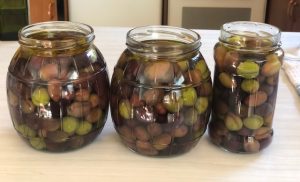 A few weeks ago, Vicki Jordan generously offered the olives from her olive trees to anyone who wanted them. Mala Plymin was one of the people who took advantage of the offer. Mala has now written in: “Thanks to Vicki for her olives. I preserved these today. Lily Angel helped me with this recipe: slit the olives and brine them in water and salt. When mixing the salt and water, put an egg in the water and, when it floats, there is enough salt in the water. I didn’t change the water. I regularly tasted the olives and, when they didn’t taste bitter, they were ready. Around two weeks. I then rinsed the olives. I mixed 60% water and 40% vinegar and then added the olives. They are now stored in sterilised jars topped with a bit of oil.“
A few weeks ago, Vicki Jordan generously offered the olives from her olive trees to anyone who wanted them. Mala Plymin was one of the people who took advantage of the offer. Mala has now written in: “Thanks to Vicki for her olives. I preserved these today. Lily Angel helped me with this recipe: slit the olives and brine them in water and salt. When mixing the salt and water, put an egg in the water and, when it floats, there is enough salt in the water. I didn’t change the water. I regularly tasted the olives and, when they didn’t taste bitter, they were ready. Around two weeks. I then rinsed the olives. I mixed 60% water and 40% vinegar and then added the olives. They are now stored in sterilised jars topped with a bit of oil.“
Something for you to read
Perhaps the closest sister spirit that this newsletter has is the Food Fairness Illawarra newsletter. Their latest newsletter highlighted the existence of the Illawarra Edible Garden Guide, which is well worth a read.
Answering an age-old question during COVID-19
Jenny Shaw has written in: “During lockdown I’ve been buying items online. Yesterday I bought a chicken and an egg. I’ll let you know.“
How to you transport your glass milk bottles?
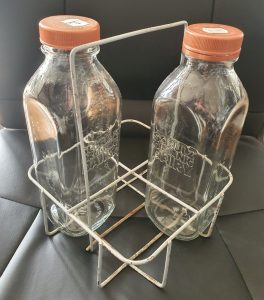
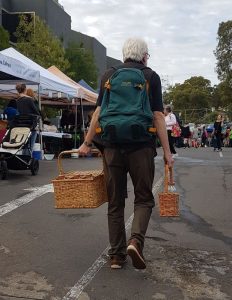 Many of us buy our milk from Schulz Organic Dairy and some of us prefer to use their (re-usable) glass bottles rather than their (single use) plastic containers. But the glass bottles aren’t the easiest things to carry around. Two newsletter readers have their preferred methods and have sent in photos to illustrate. The left hand photo is Virginia Solomons’ wicker baskets with 5 bottle positions. The right hand photo is Susan Palmer’s old style carrier with 4 bottle positions.
Many of us buy our milk from Schulz Organic Dairy and some of us prefer to use their (re-usable) glass bottles rather than their (single use) plastic containers. But the glass bottles aren’t the easiest things to carry around. Two newsletter readers have their preferred methods and have sent in photos to illustrate. The left hand photo is Virginia Solomons’ wicker baskets with 5 bottle positions. The right hand photo is Susan Palmer’s old style carrier with 4 bottle positions.
Corrections, clarifications and comments
Seed saving genetics
Robin Gale-Baker has written in: “Thanks for your article about the genetics of named varieties, which I agree with. I’m always harping on about buying commercial seed for pumpkins, brassicas and other cross-pollinators. My experience is that, whilst lots of tomato varieties usually self-pollinate, the potato leaf varieties, such as Brandywine, often cross-pollinate. The end result is that we are losing some of our varieties at Macleod Organic Community Garden and creating other variations which, whilst interesting, won’t grow true to type. For example, it looks like our Brandywine Pink crossed with our Apollo as the fruit were round like the Apollo but pink like the Brandywine Pink.“
As keen as mustard
Robin Gale-Baker has written in to ask if there is a connection between the phrase ‘as keen as mustard’ and Keen’s mustard. The answer is no. Per The Phrase Finder website: “‘As keen as mustard’ and a well-known company called Keen that made mustard. Surely we have a winner? Unfortunately not. The phrase ‘as keen as mustard’ is known from 1672, the century before the company was formed in 1742.“
Robin also points out that one of the sons of the founder of Keen’s Mustard migrated to Australia in 1841 and started a condiments business in Tasmania (Keen’s Curry Powder) which became famous too. And, whilst it started as a British company, Keen’s Mustard is now based in Melbourne and is, indeed, owned by the same company (McCormick Foods Australia) as Keen’s Curry Powder.
NERP
Virginia Solomon has written in to point out that NERP now stands for North East Region Permaculture rather than North East Ranges Permaculture, having changed its name in early 2019.
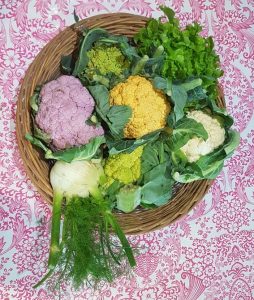 Virginia has also sent in a photo of the 5 different coloured cauliflowers that she bought at Peninsula Fresh Organics at Eltham Farmers’ Market last week.
Virginia has also sent in a photo of the 5 different coloured cauliflowers that she bought at Peninsula Fresh Organics at Eltham Farmers’ Market last week.
Meg’s social isolation week
This week, rather than staring at screens, I have been looking through old gardening magazines obtained from a past food swap. It has been fascinating: the advertisements for weed and pest control, old-fashioned hand tools and lots of potted colour. They are also a good source of garden wisdom.
Last year, I saved up to buy a three-way pear (Beurre Bosc, Williams Bon Cretain and Williams). This year, inspired by an article entitled The mug gardener’s guide by Peter De Warrt in the June 1991 edition of Your Garden magazine, I’m going to try to graft budwood from a snow apple onto my Jonathon, creating a two-way apple. Collect budwood from your favourite apple tree while its dormant, wrap the cuttings in wet newspaper and place them in the crisper-section of your fridge until spring, when the apple trees begin to shoot. I have made and stored the cuttings and will wait for spring to follow the remaining steps.
I am also taking cuttings from my well-established red and blackcurrants as they head into dormancy, making sure to use recent growth. I simple place the cuttings into a vacant section of my raised veggie beds and leave them alone to take root before giving away or transplanting in spring.
Finally, I’ve been peeling the windfall apples from the farm last weekend to make deep dish apple pie.
Deep-dish apple pie (use a deep sided baking tray)
Piecrust
2 cups plain flour
½ cup sunflower oil
¼ cup orange juice
a pinch of salt
Filling
8 large apples, peeled, cored and cut into pieces
a dessertspoon of cinnamon (or to taste)
2 teaspoons all spice
a sprinkling of plain flour
½ cup sugar
Mix all the piecrust ingredients until just combined. You want a moist dough.
Roll half of the dough between two sheets of greaseproof paper and place on bottom of baking tray (not up the sides).
Mix the filling ingredients and layer on top.
Roll out the remaining dough to top.
Bake for around 1 hour at 160degC until well browned.
Read Meg’s other recipes on our website.
Which link was clicked most times in the last newsletter?
Ann’s interview with Dan Milne.
Joke of the week
What’s orange and sounds like a parrot? A carrot.
Read more jokes.
Upcoming online events
If you know of any events other than those listed below, email me.
Newly announced events
Darebin Council are working with others to produce some free gardening videos under the heading of Backyard harvest stories. Kat Lavers will be doing two videos on her Facebook page, the first being a virtual tour of her kitchen garden (on Friday, 5th June, starting 11am) and the second being on fruit tree care (on Friday, 12th June, starting 11am). 3000acres will be doing two videos on their Facebook page, the first being on building a veggie patch from scratch (on Tuesday, 9th June, starting 3pm) and the second being on planning your Spring garden (on Tuesday, 16th June, starting 3pm).
The Jesuit Social Services’ Ecological Justice Hub is organising an online event entitled COVID-19 and food systems: impact, response and pathways to transformation on Thursday, 18th June, 6-8pm. $11. Read more and book on EventBrite.
Previously announced events
Open Table are offering free no waste cooking workshops on Thursday, 9th June, 5.30-6.15pm (homemade veggie stock) and Wednesday, 17th June, 6.30-7.15pm (pesto). Read more and register on EventBrite.
Open Table are also now offering their weekly no waste cook club workshops free and online on Saturdays. As well as cooking (which is actually optional), you will learn about food waste and composting. Register on EventBrite.
Whitehorse Council are publishing on their Youtube channel a video each Monday at 9am on various aspects of sustainability, including bee hotels (on 15th June) and beeswax wraps (on 22nd June).
CERES have moved some of their classes online.
Newsletter reader Chloe Thomson is doing free, weekly podcasts on gardening for Bunnings.
Pip Magazine (some of whose journalists live in North East Melbourne) are producing a series of videos entitled simple skills for self sufficiency.
Formidable Vegetable are producing a series of videos entitled ‘grow-vid-19’ permaculture pandemic.
Good Life Permaculture are producing a series of videos entitled crisis gardening.
All The Dirt is a weekly podcast about gardening.
Birdlife Australia are giving weekly talks on their Facebook page. The talks can be watched live starting at midday on Thursdays, or as videos afterwards.

